医学常用英语口语
医学询问的常用英语口语(最新)

【#英语口语# 导语】医学是通过科学或技术的手段处理生命的各种疾病或病变的一种学科,促进病患恢复健康的一种专业。
以下是?无忧考网整理的医学询问的常用英语口语,欢迎阅读!1.医学询问的常用英语口语1. have you been to a doctor recently?你最近看过医生吗?2. have you had any operations in the past?你过去做过手术吗?3. are you allergic to anything?你对什么过敏吗?4. when was your last period?你最近一次例假是在什么时候?5. have you been drinking at all?你是不是一直嗜酒?6. do you smoke?你抽烟吗?7. have you lost any weight recently?你近来体重减轻了吗?8. have you had your heart tested this year?你今年检查过心脏吗?9. have you ever had diabetes?你患过糖尿病吗?10. did you have the history of dyspnea?你有过呼吸困难的病史吗?2.英语口语练习方法一、调整心态“玩”可以使学习充满了无限的乐趣,如果用“玩”的心态去做某件事,即使它是困难的也会觉得充满了无限的乐趣,让你更有兴趣的坚持学下去。
二、自主性学习阅读可以增加词汇量,也可以提高自己的口语表达和语言深度。
但阅读的前提是要有一定的单词作为基础,所以首先要谈论如何把背单词变成一件快乐的事情。
这个阶段已经有一定的英语基础,不需要死记硬背每个单词,应该独立学习新单词,其实有点像我们学习汉语,用一个单词造句,或者将单词灵活运用于日常生活中的话题。
这样不仅记得准还能记得牢,每当这个单词出现的时候,脑海中可能浮现的就是某种场景或跟朋友的一个经典桥段。
医学常用医学英语日常用语翻译
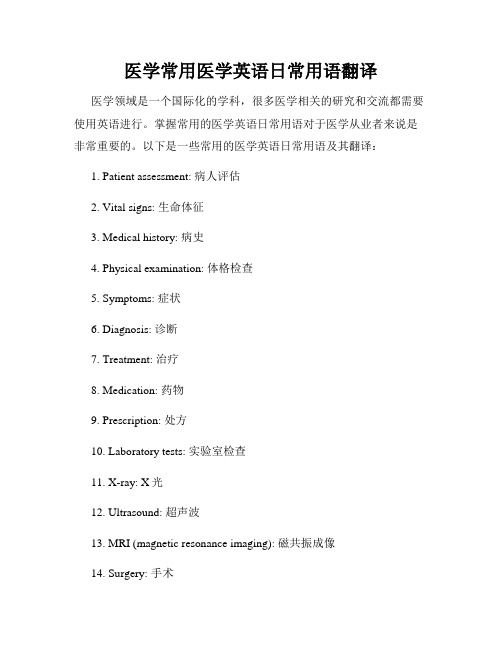
医学常用医学英语日常用语翻译医学领域是一个国际化的学科,很多医学相关的研究和交流都需要使用英语进行。
掌握常用的医学英语日常用语对于医学从业者来说是非常重要的。
以下是一些常用的医学英语日常用语及其翻译:1. Patient assessment: 病人评估2. Vital signs: 生命体征3. Medical history: 病史4. Physical examination: 体格检查5. Symptoms: 症状6. Diagnosis: 诊断7. Treatment: 治疗8. Medication: 药物9. Prescription: 处方10. Laboratory tests: 实验室检查11. X-ray: X光12. Ultrasound: 超声波13. MRI (magnetic resonance imaging): 磁共振成像14. Surgery: 手术15. Anesthesia: 麻醉16. Recovery: 恢复17. Follow-up: 随访18. Allergy: 过敏19. Infection: 感染20. Pain: 疼痛21. Fever: 发烧22. Headache: 头痛23. Nausea: 恶心24. Vomiting: 呕吐25. Diarrhea: 腹泻26. Constipation: 便秘27. Cough: 咳嗽28. Sore throat: 喉咙痛29. Fatigue: 疲劳30. Dizziness: 头晕除了以上列举的常用医学英语日常用语外,医学领域还有许多专业术语需要用英语进行表达。
在学习和使用医学英语时,需要根据具体的学科领域进行适当的词汇积累和表达。
同时,注意对于不同语境下的翻译需求,即在交流和书面表达中使用恰当的术语和表达方式。
总结:掌握常用的医学英语日常用语对于医学从业者来说是至关重要的。
在医学交流和研究中,准确的表达和理解都离不开恰当的专业术语。
医学英语口语表达大全

医学英语口语表达大全为了帮助大家学好医学英语,下面小编给大家带来医学英语口语表达大全,希望对大家有所帮助!医学英语口语表达:胃肠胃肠Stomach & Bowels(1)当空腹时,他感觉胃里不舒服。
He has a certain disagreeable felling in the stomach when it is empty.胃不调upset stomach消化不良have bad(impaired:defective)digestion;suffer from indigestion(dyspepsia)胃有毛病have a disordered stomach(stomach disorder);something is wrong with one's stomach.因过食而伤胃injure one's stomach by overeating oneself觉食物积滞胃中feel heavy on the stomach食物不易消化lie(sit)heavy on one's stomach自从那时起,消化便已失常。
Thereafter,the digestion was not really good.曾有过一时性的恶心和呕吐,但并没有食欲不振或体重减少发生。
Transient nausea and vomiting was present,but no anorexia or weight loss occurred.欲呕feel nauseated有晨吐have morning sickness夜吐(饭后恶心)nocturnal(postprandial)nausea晕船(车)be sea-(car-)sick有点恶心have(experience)some nausea严重的作呕have considerable retching里急后重时发生恶心和呕吐have a spell of N & V while straining at stool患食欲不振和恶心be anorexic and nauseated偶而恶心和呕吐develop occasional nausea and vomiting老是溢酸,感觉腹胀burp all the time,feel bloated吐出清净透明的胃容物with vomiting of clear gastric contents 呕吐停了,消失了vomiting stopped(ceased),cleared止吐settle the stomach打噎belch(eruct;eructate)这病人恶心,曾呕吐了含有胆汁液体数次。
医学生物学英语口语
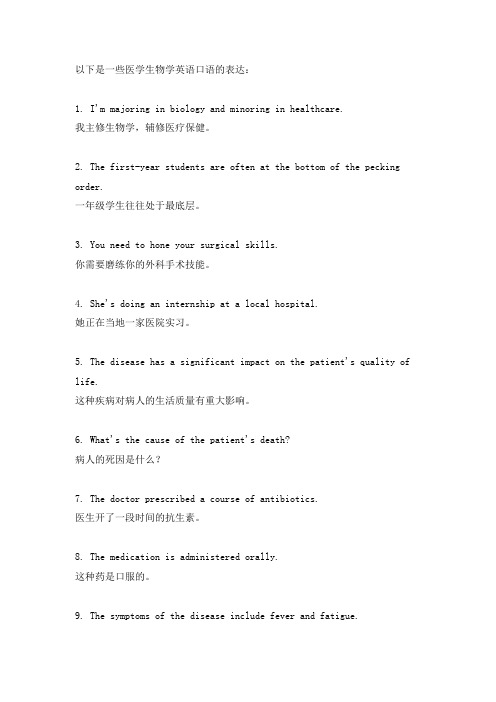
以下是一些医学生物学英语口语的表达:
1. I'm majoring in biology and minoring in healthcare.
我主修生物学,辅修医疗保健。
2. The first-year students are often at the bottom of the pecking order.
一年级学生往往处于最底层。
3. You need to hone your surgical skills.
你需要磨练你的外科手术技能。
4. She's doing an internship at a local hospital.
她正在当地一家医院实习。
5. The disease has a significant impact on the patient's quality of life.
这种疾病对病人的生活质量有重大影响。
6. What's the cause of the patient's death?
病人的死因是什么?
7. The doctor prescribed a course of antibiotics.
医生开了一段时间的抗生素。
8. The medication is administered orally.
这种药是口服的。
9. The symptoms of the disease include fever and fatigue.
这种疾病的症状包括发热和疲劳。
10. The scientific community is divided on the issue. 科学界在这个问题上存在分歧。
医院相关英语口语
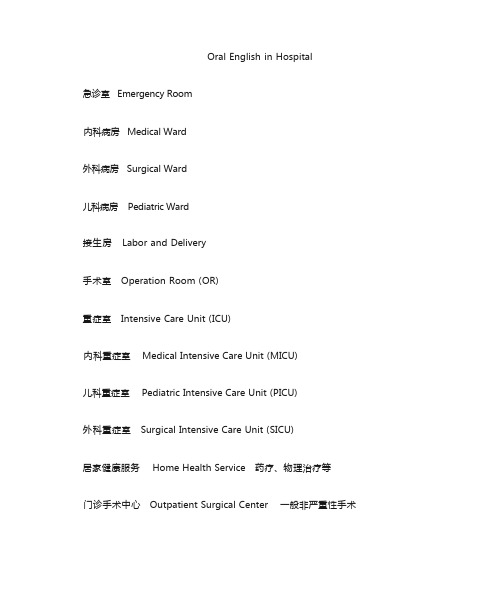
Oral English in Hospital急诊室 Emergency Room内科病房 Medical Ward外科病房 Surgical Ward儿科病房 Pediatric Ward接生房 Labor and Delivery手术室 Operation Room (OR)重症室 Intensive Care Unit (ICU)内科重症室 Medical Intensive Care Unit (MICU)儿科重症室 Pediatric Intensive Care Unit (PICU)外科重症室 Surgical Intensive Care Unit (SICU)居家健康服务 Home Health Service 药疗、物理治疗等门诊手术中心 Outpatient Surgical Center 一般非严重性手术药房 Pharmacy 药物、医疗用品Health Care Provider 医疗服务Physician 医生Dentistry 牙科Dermatology 皮肤科Nurse 护士头痛 headache感冒 cold咳嗽 cough胃肠炎 gastroenteritis癌症 cancer禽流感 bird flu/avian influenza非典 SARS(Severe Acute Respiratary Syndrome)疯牛病 mad cow disease黑死病 black death白血病 leukemia流感 influenza白内障 cataract狂犬病 rabies中风 stroke心脏病 heart disease发烧 fever过敏Allergy检查 Examination入院 Admission to Hospotial 退院 Discharge from Hospital营养Nutrition病例Clinical History 诊断Diagnosis治疗Treatment预防Prevention血型BloodType血压Blood Pressure 手术Operation注射Injection体格Build高烧High Fever发冷Chillsz发汗Sweats盗汗 Night Sweats失眠Insomnia打喷嚏 Sneeze打嗝 Hiccup痒 Itch腰疼 Low Back Pain头疼 Headache急性疼痛 Acute Pain医务人员常用语1.What can do for you ?你有什么事?2. May I help you ?我能帮你什么忙?3. Please take a seat ! please sit down !请坐下.4.Wait a moment ,please.请等一等.5.Sorry to have kept you waiting. 对不起让你久等了.6.It is not serious .病情不严重.7. Don't worry. There is nothing to worry about. 不必顾虑。
常用医学英语口语对话英语情景对话两人医学

常用医学英语口语对话英语情景对话两人医学常用医学英语口语对话常用医学英语口语对话患失眠症Patient(P) Doctor(D) P:Good morning,doctor. D:Good morning. What seems to be the trouble P:I“m suffering from insomnia. D:How long have you had this problem P:Three months. D:Have you take any medicine P:I tried some sleeping pills,but they have done nothing for me. D:Do you have headaches P:Sometimes. I have no appetite and always on the edge. D:Let me take your blood pressure. You look anemic. (Taking the P“s blood pressure.) Doctor:Well,there is nothing to be alarmed about. You are just a little exhausted from overwork. P:What should I do then D:I think you need more rest. Try to get outdoors more. Don"t strain yourself too much. P:Thank you. Doctor. I"ll do as you say. D:Here is the prescription for you. I"m sure the medicine will cure your insomnia. P:Thanks a lot. Bye-bye!D:Bye! 单词Words insomnia n. 失眠症appetite n. 胃口pressure n. 压力,血压anemic n. 贫血病exhausted adj 疲倦,筋疲力尽overwork n. 过度劳累outdoors adv 户外cure n. vt 治愈,治好短语Phrases suffer from 遭受sleeping pills 安眠药on the edge 紧张不安take sb"s blood pressure 量血压句子Sentence Patterns What seems to be the trouble 哪里不舒服How long have you had this problem 这种情况有多久了I tried some sleeping pills,but they have done nothing for me.我试过安眠药,但是对我一点儿都不起作用。
常用医学英语口语对话
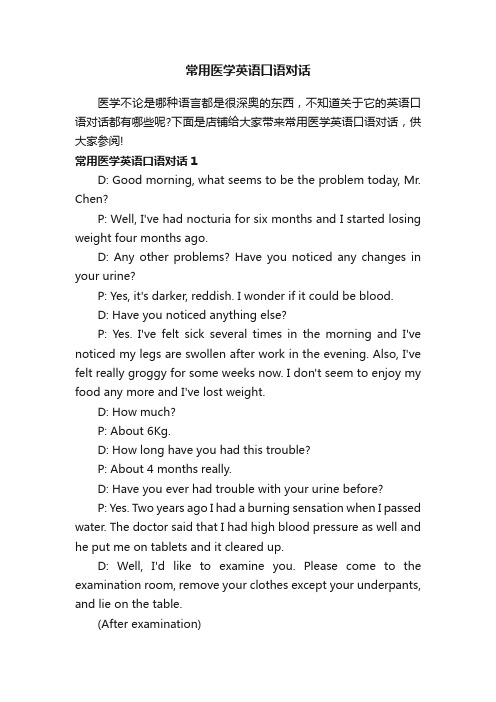
常用医学英语口语对话医学不论是哪种语言都是很深奥的东西,不知道关于它的英语口语对话都有哪些呢?下面是店铺给大家带来常用医学英语口语对话,供大家参阅!常用医学英语口语对话1D: Good morning, what seems to be the problem today, Mr. Chen?P: Well, I've had nocturia for six months and I started losing weight four months ago.D: Any other problems? Have you noticed any changes in your urine?P: Yes, it's darker, reddish. I wonder if it could be blood.D: Have you noticed anything else?P: Yes. I've felt sick several times in the morning and I've noticed my legs are swollen after work in the evening. Also, I've felt really groggy for some weeks now. I don't seem to enjoy my food any more and I've lost weight.D: How much?P: About 6Kg.D: How long have you had this trouble?P: About 4 months really.D: Have you ever had trouble with your urine before?P: Yes. Two years ago I had a burning sensation when I passed water. The doctor said that I had high blood pressure as well and he put me on tablets and it cleared up.D: Well, I'd like to examine you. Please come to the examination room, remove your clothes except your underpants, and lie on the table.(After examination)D: You can get dressed now ... well, it looks like you have some reduced kidney function. I want you to take some blood tests, X-rays and kidney function tests. I'd like you to collect your urine for 24 hours. The nurse will tell you exactly how to do it.Then we'll ask you to come in for an ultrasound examination of the kidneys. This is a very simple procedure to make sure there is no obstruction.P: Can you tell me exactly what is wrong with my kidneys?D: Well, the tests show that you are in a condition called chronic glomerulonephritis, which has damaged the kidneys.P: Is the chronic glomerulonephritis severe? Are there any good treatments to repair the kidney damage?D: Yes, of course. You'd better stay in the hospital for treatments, and observation. We'll have to insert a tube into your abdomen to flash out toxic substances in the blood stream.P: How long will I have to stay in hospital? Will I have to stop working?D: For about 3-4 weeks. Just remind me. What's your job?P: I'm a teacher.D: Well, I should advise you to have a 2-month rest.P: Thank you doctor.D: Not at all.参考译文医生:早上好,陈先生,你哪里不舒服?病人:我夜尿多(遗尿)六个月了,而且我四个月前体重开始下降。
医学英语口语对话
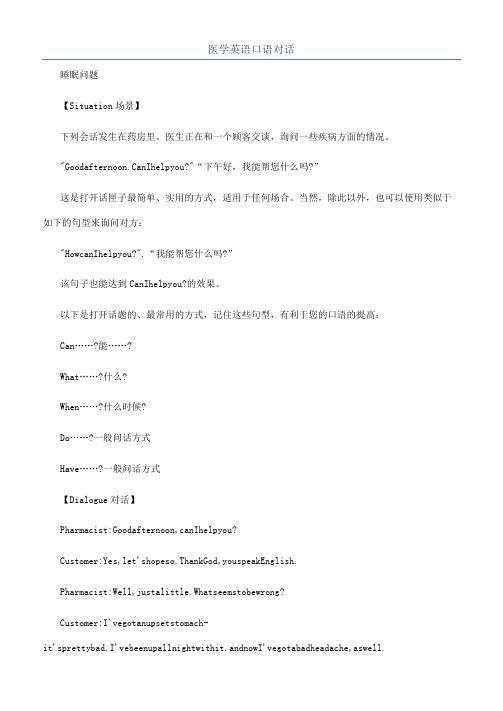
医学英语口语对话睡眠问题【Situation场景】下列会话发生在药房里。
医生正在和一个顾客交谈,询问一些疾病方面的情况。
"Goodafternoon.CanIhelpyou?"“下午好,我能帮您什么吗?”这是打开话匣子最简单、实用的方式,适用于任何场合。
当然,除此以外,也可以使用类似于如下的句型来询问对方:"HowcanIhelpyou?".“我能帮您什么吗?”该句子也能达到CanIhelpyou?的效果。
以下是打开话题的、最常用的方式,记住这些句型,有利于您的口语的提高:Can……?能……?What……?什么?When……?什么时候?Do……?一般问话方式Have……?一般问话方式【Dialogue对话】Pharmacist:Goodafternoon,canIhelpyou?Customer:Yes,let'shopeso.ThankGod,youspeakEnglish.Pharmacist:Well,justalittle.Whatseemstobewrong?Customer:I'vegotanupsetstomach-it'sprettybad.I'vebeenupallnightwithit.andnowI'vegotabadheadache,aswell.Pharmacist:Isee.Whendiditfirststart?Customer:WhenIwenttobed.Pharmacist:Doyouthinkit'ssomethingyouhaveeaten? Customer:Oh,forsure.I'mnotusedtoallthiswininganddininng. Pharmacist:No-itcanbeprettystrong.Customer:I'llsay!Youcansaythatgain!Pharmacist:Haveyougotdiarrhoea?Isitveryloose? Customer:Thisiswhatitfeelslike.Pharmacist:Howoftendoyouhavetogo?Customer:Ihavetogoeveryfewminutes.【Vocabulary词汇】diarrhoean.腹泻headachen.头痛stomachn.胃looseadj.松散的;宽松的upsetstomach肚子不舒服wininganddining饮食Youcansaythatagain!(口语)没错!您说对了。
医学人员常用英语口语
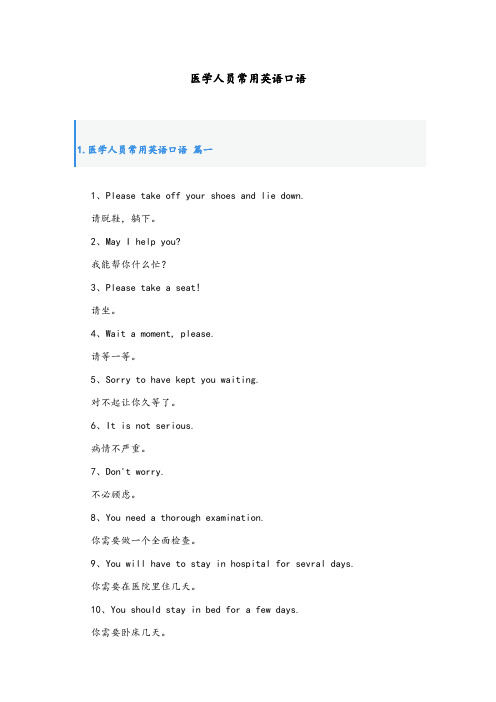
医学人员常用英语口语1.医学人员常用英语口语篇一1、Please take off your shoes and lie down.请脱鞋,躺下。
2、May I help you?我能帮你什么忙?3、Please take a seat!请坐。
4、Wait a moment, please.请等一等。
5、Sorry to have kept you waiting.对不起让你久等了。
6、It is not serious.病情不严重。
7、Don't worry.不必顾虑。
8、You need a thorough examination.你需要做一个全面检查。
9、You will have to stay in hospital for sevral days.你需要在医院里住几夭。
10、You should stay in bed for a few days.你需要卧床几天。
2.医学人员常用英语口语篇二1、You can keep on working.可以继续工作。
2、You should be very careful for a week or two.这一两周内,你需要很注意。
3、Try to relax and keep calm.尽量放松保持镇静。
4、You'll soon be all right.你很快就会好起来的。
5、1'm sure this medicine will help you a great deal.这药对你肯定会很有效的。
6、Feeling well again is a rather slow process, I'm afraid.恐怕痊愈将是一个很慢的过程。
7、You will have to wait for twenty minutes.你需要等20分钟。
8、Complete recovery will take a rather long time.彻底恢复需要一段很长的时间。
医学英语口语
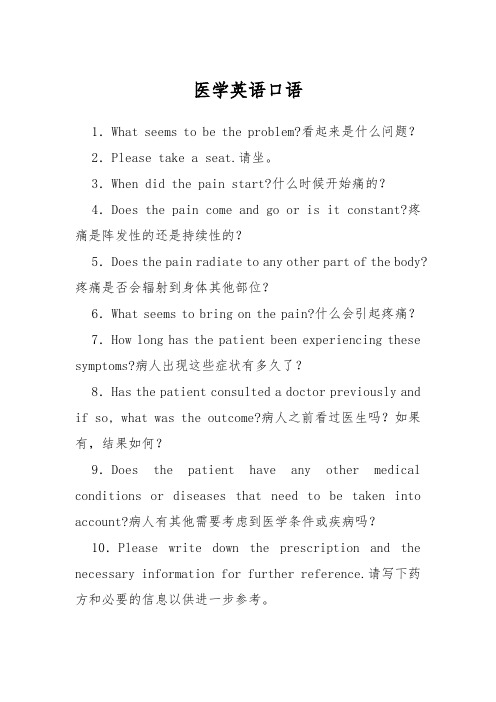
医学英语口语
1.What seems to be the problem?看起来是什么问题?
2.Please take a seat.请坐。
3.When did the pain start?什么时候开始痛的?
4.Does the pain come and go or is it constant?疼痛是阵发性的还是持续性的?
5.Does the pain radiate to any other part of the body? 疼痛是否会辐射到身体其他部位?
6.What seems to bring on the pain?什么会引起疼痛?
7.How long has the patient been experiencing these symptoms?病人出现这些症状有多久了?
8.Has the patient consulted a doctor previously and if so, what was the outcome?病人之前看过医生吗?如果有,结果如何?
9.Does the patient have any other medical conditions or diseases that need to be taken into account?病人有其他需要考虑到医学条件或疾病吗?
10.Please write down the prescription and the necessary information for further reference.请写下药方和必要的信息以供进一步参考。
常用临床医学英语口语术语
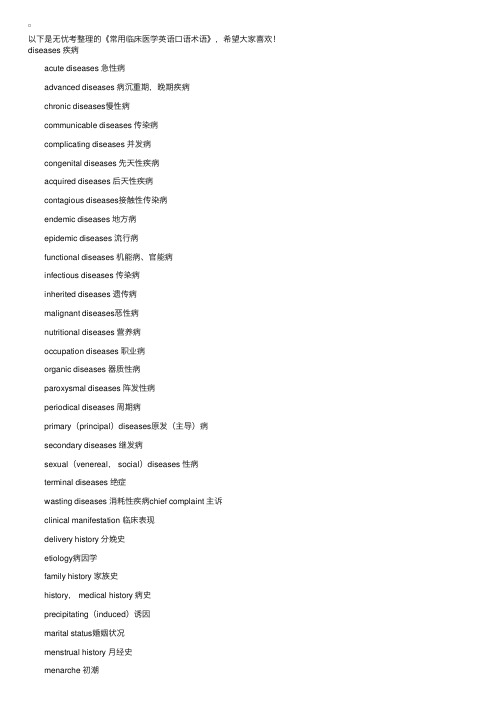
以下是⽆忧考整理的《常⽤临床医学英语⼝语术语》,希望⼤家喜欢!diseases 疾病 acute diseases 急性病 advanced diseases 病沉重期,晚期疾病 chronic diseases慢性病 communicable diseases 传染病 complicating diseases 并发病 congenital diseases 先天性疾病 acquired diseases 后天性疾病 contagious diseases接触性传染病 endemic diseases 地⽅病 epidemic diseases 流⾏病 functional diseases 机能病、官能病 infectious diseases 传染病 inherited diseases 遗传病 malignant diseases恶性病 nutritional diseases 营养病 occupation diseases 职业病 organic diseases 器质性病 paroxysmal diseases 阵发性病 periodical diseases 周期病 primary(principal)diseases原发(主导)病 secondary diseases 继发病 sexual(venereal, social)diseases 性病 terminal diseases 绝症 wasting diseases 消耗性疾病chief complaint 主诉 clinical manifestation 临床表现 delivery history 分娩史 etiology病因学 family history 家族史 history, medical history 病史 precipitating(induced)诱因 marital status婚姻状况 menstrual history ⽉经史 menopause闭经 past history既往史 pathogenesis 发病机制 personal history 个⼈史symptoms 症状 cardinal symptom 主要症状 classical symptom 典型症状 concomitant symptom 伴发症状 constitutional(systemic) symptom 全⾝症状 indirect symptom 间接症状 induced symptom 诱发症状 local symptom 局部症状 mental symptom精神症状 symptom-complex (syndrome)symptom 综合症,症候群 signs体征 antecedent 前驱征 assident (accessory)副征 commemorative 后遗症 sign of death 死征 diagnostic诊断征 sign of disease 病征 subjective ⾃觉征,主观征 vein sign静脉征vital sign ⽣命体征 body length (height of the body)⾝⾼ body weight 体重 barrel chest 桶状胸 cachexia 恶病质 compulsive position 被动体位 critical facies 病危⾯容 emaciation 消瘦 enophthalmos 眼球下陷 entropion 睑内翻 exophthalmos 眼球突出 flushed face ⾯⾊潮红 gain (loss) in weight 增加(减轻)体重 lordosis 脊柱前凸医.学教育整理 nasal ala flap ⿐翼扇动 nystagmus 眼震 obesity 肥胖 pallor 苍⽩ scolisis 脊柱侧凸 agitation 焦急不安 debility, weakness 虚弱 diaphoresis 出汗,⼤量出汗 dizziness, vertigo 眩晕 lassitude, fatigue ⽆⼒,倦怠 malaise 不适 night sweat 盗汗 numbness ⿇⽊ rigor, chill 寒冷,发冷 perspiration, sweating 出汗 pruritus, itching 痒, somasthenia 躯体⽆⼒ tingling ⿇刺感abscess 脓肿 acidosis 酸中毒 adhesion 粘连 alkalosis 碱中毒 allergy 过敏 coagulation defect 凝⾎不良 congestion 充⾎ dehydration 脱⽔ distention 膨胀 edema ⽔肿 embolism 栓塞,栓塞形成 fluid and electrolyte imbalance ⽔电解质紊乱 gangrene 坏疽 hematoma ⾎肿 hemorrhage, bleeding 出⾎ infarction 梗塞,梗死 inflammation 炎症 ketoacidosis 酮酸中毒 metastasis 转移 perforation 穿孔 necrosis 坏死 shock 休克 response 反应,应答 reaction 反应,感应 thrombosis ⾎栓形成 ulceration 溃疡fever, pyrexia 发烧,发热 continuous fever 稽留热 intermittent fever 间歇热 low-grade fever 低热 remittent fever 驰张热 relapsing fever 回归热pain 痛 burning pain 灼痛 chest(flank,…) pain 胸(胁腹…)痛 cramp-like pain 痉挛性痛 dull, diffused pain 弥漫性钝痛 pleuritic pain 胸膜炎性痛 radiating pain (pain radiating to…)放射性痛(放射到…疼痛)angina 绞痛 cardiac angina ⼼绞痛 backache 背痛 colic 绞痛,急腹痛 earache ⽿痛 headache 头痛 neuralgia 神经痛 migraine 偏头痛 rebound tenderness 反跳痛 somatalgia 躯体痛 sore throat 咽喉痛 stomachache 胃痛 toothache ⽛痛 bloody sputum 带⾎的痰 dry cough ⼲咳 expectoration 咳痰 expectoration of blood 咳⾎ hemoptysis 咳⾎anoxia 缺氧 apnea 呼吸暂停,窒息 asthma ⽓喘,哮喘 Cheyne Stokes respiration 切-斯⽒呼吸,潮式呼吸 dyspnea 呼吸困难 hyperpnea hyperventilation 过度呼吸,换⽓过度 hypopnea 呼吸不全,呼吸浅表 hypoxia 低氧,缺氧 orthopnea 端坐呼吸 respiratory arrest 呼吸停⽌ suffocation 窒息 tachypnea 呼吸急促 fetid breath ⼝臭 fruity breath 呼吸有⽔果味arrhythmia ⼼律失常,⼼律不齐 atelectasis 肺不张,肺膨胀不全 cardiac arrest ⼼搏骤停 cardiac hypertrophy ⼼脏肥⼤ cyanosis 发绀,青紫 distension of jugular vein 颈静脉怒张 extrasystole 期外收缩 gallop rhythm 奔马律 hemopleura ⾎胸 hepatojugular reflux 肝颈静脉回流 hypovolemia (循环)⾎容量减少 palpitation ⼼悸 tachycardia ⼼动过速 pneumothorax ⽓胸 thrill 震颤 absent breath sounds 呼吸⾳消失 dull sound 浊⾳ hyperresonant ⿎⾳ rhonchus, rhonchi 鼾⾳,⼲啰⾳ wheeze 哮鸣⾳anorexia, loss of appetite ⾷欲不振,厌⾷ dysphagia 吞咽困难 eructation 嗳⽓ belching 嗳⽓ flatulence ⽓胀 flatus 肠胃⽓,* gaseous distention 胃胀⽓ hematemesis 呕⾎ hiccough, hiccup 打呃,呃逆 nausea 恶⼼ pyrosis 胃灼热 regurgitation 反胃,回流 thirsty ⼝渴 vomiting 呕吐 anal fissure, crack in the anal canal 肛裂 ascites 腹⽔ board-like rigidity of the abdomen 板状腹 decreased tactile fremitus 触觉性震颤减弱 exophageal varices ⾷管静脉曲张 fistula 瘘,瘘管 hemorrhoid 痔 hernia 疝 hepatomegaly 肝肿⼤ intussusception 肠套叠 jaundice 黄疸 muscle guarding, defence of the abdominal wall 腹壁肌卫 peristalsis 蠕动 loss of peristalsis 蠕动消失 mass peristalsis 总蠕动 retrograde (reversed) peristalsis 逆蠕动 prolapse 脱垂 prolapse of anus 脱肛 rectal prolapse 直肠脱垂,脱肛 biliary calculus 胆结⽯ vesical calculus 膀胱结⽯constipation 便秘 defecation 排便 diarrhea 腹泻 incontinence of feces ⼤便失禁 hematochezia 便⾎ fecal impaction ⼤便嵌塞 occult blood 潜⾎ painful straining with defecation 排便痛性牵动 clay colored stools 陶⼟⾊便 dark, granular/coffee ground emesis 咖啡样呕吐物 fecal vomiting, stercoraceous vomiting 呕粪,吐粪 foul fatty stools, steatorrhea 恶臭脂肪便,脂肪痢 scanty and hard stools 便少⽽硬 tarry (black) stools 柏油样便anuria ⽆尿 burning sensation no urination 排尿时的灼烧感 dysurea 排尿困难,尿痛 enuresis, bed wetting 遗尿 frequency of urination 尿频 micturation 排尿 uresis, urination, voiding 排尿 nocturia 夜尿 oliguria 少尿 polyuria 多尿 tenesmus ⾥急后重 vesical tenesmus 排尿时⾥急后重 uremia coma 尿毒症昏迷 urgency of urination 尿急 urinary incontinence 尿失禁aciduria 酸尿 chyluria 乳糜尿 cylindruia 管型尿 glycosuria 糖尿 hematuria ⾎尿 ketonuria 酮尿 proteinuria 蛋⽩尿 pyuria 脓尿amenorrhea 经闭,⽆⽉经 dysmenorrhea 痛经 menorrhagia ⽉经过多 lochia 恶露 menorrhea ⾏经,⽉经过多 menstruation ⽉经 uterine contraction ⼦宫收缩blotch 斑点 bruise 挫伤,青肿 acne 痤疮,粉刺 desquamation 脱⽪,脱屑 ecchymosis 瘀斑 loss of skin turgor 失去⽪肤充盈 nevus 痣 papule 丘疹 petechia 瘀点,瘀斑 pigmentation ⾊素沉着 pustule 脓疱 purpura 紫癫 red nodule 红结节 roseola 玫瑰疹 scar 伤疤 senile plaque ⽼⼈斑 spider anaioma 蛛形痣 subcutaneous nodule ⽪下结节 urticaria 荨⿇疹 vesicle ⼩⽔疱 vitiligo ⽩斑blindness 失明 blurred vision, visual disturbance 视⼒模糊 impaired vision 视⼒下降 lacrimation 流泪 papilledema 视神经*⽔肿 photophobia 畏光,羞明 retinal detachment 视膜脱离deafness 聋 epistaxis, nasal bleeding ⿐出⾎ impaired smelling 嗅觉障碍 nasal discharge ⿐涕 nasal obstruction ⿐塞 sneeze 喷嚏 snore 打鼾 aphonia, loss of voice 失⾳症 hoarseness 嘶哑 gum bleeding 齿龈出⾎ herpes labialis 唇疱疹,感冒疮 Koplik‘s spots 科普利克斑 lead line of the gum 龈铅线 salivation, drooling 流⼝⽔ straw-berry tongue 草莓⾆ tremulous tongue ⾆震颤atrophy 萎缩 contracture 挛缩 deformity 畸形,变形 dislocation 脱位 fracture ⾻折 closed (simple)fracture ⽆创⾻折,单纯性⾻折 comminuted fracture 粉碎性⾻折 compound fracture 哆开(开放性)⾻折 knock-knee 膝外翻 opisthotonos ⾓⼸反张 prosthesis 假体 spasm 痉挛 tetany (肌)强直,⼿⾜抽搦 wrist drop 腕下垂aphasia 失语 ataxia 共济失调 coma 昏迷 consciousness 知觉,意识 convulsion 抽搐,惊厥 delirium 谵妄 hallucination 幻觉 hemiplegia 偏瘫 increased intracranial pressure 颅内压增⾼ insanity 精神错乱 loss of orientation 定向丧失 mania 躁狂 memory defects, amnesia 记忆缺损,遗忘症 paraplegia 截瘫,下⾝⿇痹 projectile vomiting 喷射性呕吐 somnolence,(lethargy)昏睡,嗜睡 stupor ⽊僵,昏呆 tetraplegia 四肢瘫痪 unconsciousness 失去知觉 yawning 打哈⽋crisis 危象 cerebral (febrile, hematic, hemolytic,hypertensive, thyrotoxic, ……) crisis 脑(热、⾎性、溶⾎、⾼⾎压、甲状腺中毒…)危象 failure 衰竭,故障 central (circulatory, cardiac, myocardiac, peripheral, congestive, renal, respiratory) failure 中枢(循环、⼼⼒、⼼肌、周围循环、充⾎性、肾、呼吸…)衰竭diagnosis诊断 auscultation 听诊 inspection 视诊 palpation触诊 percussion 叩诊 laboratory examination 实验室检查 physical examination 体格检查 rectal (vaginal) touch 直肠(阴道)指诊 impression 印象 tentative diagnosis 暂定诊断 differential diagnosis 鉴别诊断 final diagnosis 最后诊断 prognosis 预后 prescription 处⽅ incubation (latent) period 潜伏期 incipient stage 初期 quiescent stage 静⽌期 alleviation 减轻,缓和 remission 缓解 attack 发作 convalescence (recovery) stage 恢复期 rehabilitation 康复 relapse 复发 sudden death 猝死 moribund 濒死的 course of the disease 病程 course of the treatment 疗程 indication 适应症,指征 complication 并发症 contraindication 禁忌症 side-effect 副作⽤ sequel (sequela), after effect 后遗症 therapies 治疗⽅法 acupuncture therapy 针刺疗法 block therapy 封闭疗法 chemical therpy (chemo-therapy)化学疗法 combined therapy 综合疗法 conservative therapy 保守疗法 constitutional therapy 全⾝疗法 dietetic therapy 饮⾷疗法 operative treatment ⼿术疗法 palliative treatment, alleviative treatment 姑息疗法 physical therapy 物理疗法 psychotherapy 精神疗法 radical treatment 根治 radio-therapy 放射性疗法 supporting treatment ⽀持疗法 symptomatic treatment对症疗法 cardiac massage ⼼脏按摩 cardiac pacing ⼼脏起博 electrotherapy 电疗法 electroshock treatment 电休克疗法 hemodialysis ⾎液透析 hyperbaric therapy ⾼压氧疗法 insulin-shock treatment 胰岛素休克疗法 light therapy 光疗法 therapeutic gymnastics 医疗体育。
医学英语口语:常用护理英语80句
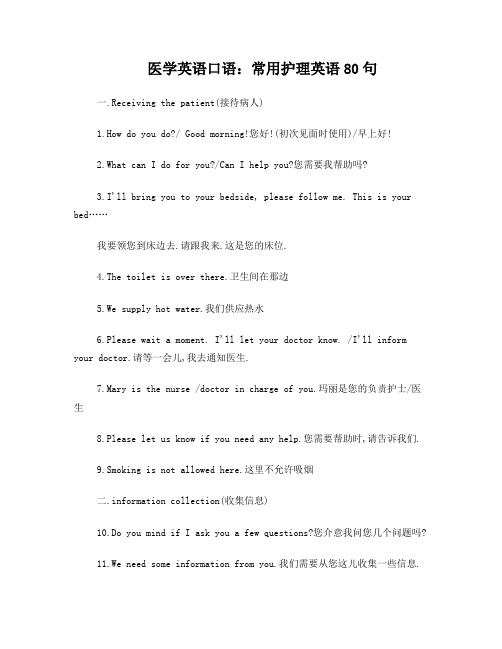
医学英语口语:常用护理英语80句一.Receiving the patient(接待病人)1.How do you do?/ Good morning!您好!(初次见面时使用)/早上好!2.What can I do for you?/Can I help you?您需要我帮助吗?3.I'll bring you to your bedside, please follow me. This is your bed……我要领您到床边去.请跟我来.这是您的床位.4.The toilet is over there.卫生间在那边5.We supply hot water.我们供应热水6.Please wait a moment. I'll let your doctor know. /I'll informyour doctor.请等一会儿,我去通知医生.7.Mary is the nurse /doctor in charge of you.玛丽是您的负责护士/医生8.Please let us know if you need any help.您需要帮助时,请告诉我们.9.Smoking is not allowed here.这里不允许吸烟二.information collection(收集信息)10.Do you mind if I ask you a few questions?您介意我问您几个问题吗?11.We need some information from you.我们需要从您这儿收集一些信息.12.Is your tummy still sore?您的肚子还疼吗?13.Does your pain come on after or before meals?您的疼痛是在饭前还是饭后发作?14.Does it hurt to pass urine?/when I press here?排尿时痛吗?/当我按压这儿时痛吗?15.Does your back ache?您的后背痛吗?16.Do your feet swell?您的脚肿了吗?17.Do you have a cough/fever?您咳嗽吗?/您有发热吗?18.Do you bring up any sputum?您咳痰吗?19.Is there any radiation of the pain ?(to the shoulder)有放射(到肩部的)痛吗?20.How long have you had the pain?您的痛有多长时间了?21.When did the pain start?/where is your pain?疼痛从什么时候开始的/什么地方疼痛?22.Are your periods regular?您的月经规则吗?三.Physical examination(查体)23.Will you please undress for medical examination?请您脱下衣服做体检好吗?24.Take off your clothes, please.请把衣服脱下来25.Lie down on the couch, please./Just lie still on the couch and relax.请躺在治疗床上./请安静地躺在治疗床上,放松.26.Bend your knees, please.请屈膝.27.Ope n your mouth and say 'ah“张开口,说:啊28.Beathe deeply, please./take a deep breath, please.请深呼吸29.May I examine your tummy, please?我要检查下您的肚子,好吗?30.Roll up your sleeves, please.请卷起袖子.四.communication.(交流)31.I am going to take your temperature./Please put the thermometer under your armpit.我要测一下您的体温/请把体温计放在您的腋下.32.Let me feel your pulse.让我测一下您的脉搏.33.I'll test/take your blood pressure.我要测量您的血压.34. I'm afraid I have to prick your finger and take a drop of blood for blood sugar level.我要取一滴指血做血糖测定,需要刺一下手指.35.I'll take some blood from your arm now.现在我要从您的胳膊抽血.36.Don't take any thing by mouth after midnight until the blood is drawn tomorrow morning .半夜之后不要吃喝任何东西,明天早上抽血.37.Please bring a specimen of your urine/stool/sputum./ please collect your mid-stream specimen of urine.请留一份尿/便/痰的标本/请收集您的中段尿.38.Please have your blood and urine tests done.请做一下您的血和尿试验.39.You are going to have a CT-scan of your chest/head today.今天您要做一个胸部/头部CT.40.You are going to have a chest X-ray this morning.今天早上您要拍一个胸片.41.You are going to have a B-mode ultrasonic exam. Please keep your bladder full.您要做B超检查,请留尿,使膀胱充盈.42.You are going to have an gastric endoscopy tomorrow morning. please don't eat or drinkanything after 12 o'clock tonight.明天上午您要做胃镜检查,今晚12点之后,请不要吃喝任何东西。
常用医学英语口语对话
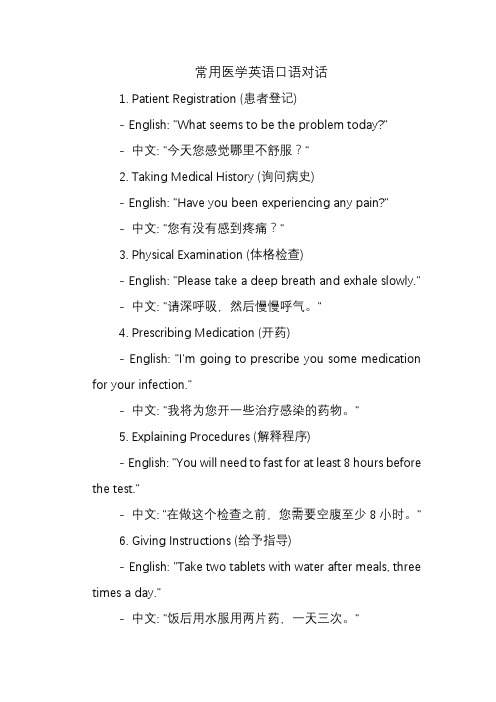
常用医学英语口语对话1. Patient Registration (患者登记)- English: "What seems to be the problem today?"- 中文: "今天您感觉哪里不舒服?"2. Taking Medical History (询问病史)- English: "Have you been experiencing any pain?"- 中文: "您有没有感到疼痛?"3. Physical Examination (体格检查)- English: "Please take a deep breath and exhale slowly."- 中文: "请深呼吸,然后慢慢呼气。
"4. Prescribing Medication (开药)- English: "I'm going to prescribe you some medication for your infection."- 中文: "我将为您开一些治疗感染的药物。
"5. Explaining Procedures (解释程序)- English: "You will need to fast for at least 8 hours before the test."- 中文: "在做这个检查之前,您需要空腹至少8小时。
"6. Giving Instructions (给予指导)- English: "Take two tablets with water after meals, three times a day."- 中文: "饭后用水服用两片药,一天三次。
常用医学英语口语对话完整版
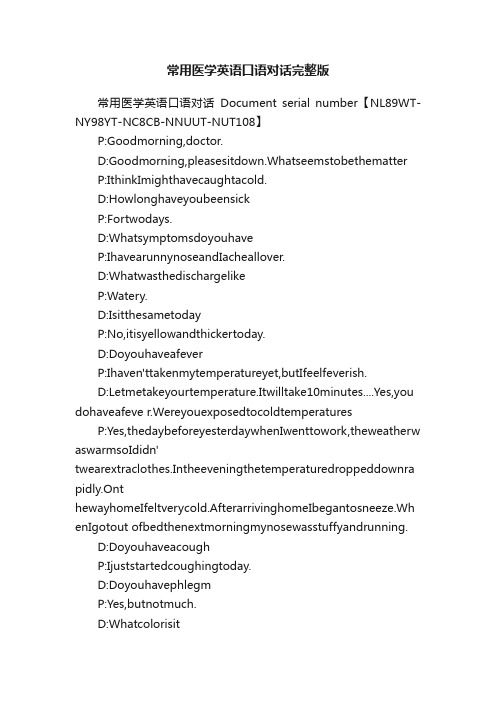
常用医学英语口语对话完整版常用医学英语口语对话Document serial number【NL89WT-NY98YT-NC8CB-NNUUT-NUT108】P:Goodmorning,doctor.D:Goodmorning,pleasesitdown.Whatseemstobethematter P:IthinkImighthavecaughtacold.D:HowlonghaveyoubeensickP:Fortwodays.D:WhatsymptomsdoyouhaveP:IhavearunnynoseandIacheallover.D:WhatwasthedischargelikeP:Watery.D:IsitthesametodayP:No,itisyellowandthickertoday.D:DoyouhaveafeverP:Ihaven'ttakenmytemperatureyet,butIfeelfeverish.D:Letmetakeyourtemperature.Itwilltake10minutes....Yes,you dohaveafeve r.WereyouexposedtocoldtemperaturesP:Yes,thedaybeforeyesterdaywhenIwenttowork,theweatherw aswarmsoIdidn'twearextraclothes.Intheeveningthetemperaturedroppeddownra pidly.OnthewayhomeIfeltverycold.AfterarrivinghomeIbegantosneeze.Wh enIgotout ofbedthenextmorningmynosewasstuffyandrunning.D:DoyouhaveacoughP:Ijuststartedcoughingtoday.D:DoyouhavephlegmP:Yes,butnotmuch.D:WhatcolorisitP:Paleyellow.D:IsiteasytocoughupP:Notvery.Ihavetouseefforttocoughitup.Thephlegmisalittlest icky.D:HaveyoubeensweatingP:Isweatedalittleaftertakingsomemedicineforfeverlastnight.D:AreyouthirstyP:Yes,Ifeellikedrinkingcoolwater.D:DoyouhaveasorethroatP:Yes,Ido.D:Iwanttolookatyourthroat.Pleaseopenyourmouth.D:DoyoufeelanyotherdiscomfortP:IfeelsoreeverywhereandIfeelverytiredtoo.D:Pleasestickoutyourtongueandletmehavealook.Youhaveare dtonguewiththinandyellowcoating,whichindicateswindandheatinthesuperficiala rea.Pl easeputyourhandhereandletmefeelyourpulse....Thepulseissuperfi ciala ndrapid.P:WhatdoesasuperficialandrapidpulsemeanD:Asuperficialpulsemeanstheattackofpathogenstotheexterio rlayeroftheb odywhichiscalledexteriorsyndromeinTraditionalChinesemedicine ,while arapidpulseindicatesheat.P:WhatisthediagnosisofChinesemedicineformeD:Itisacommoncold.Accordingtothesymptoms,themanifestat ionofthetongue andpulse,youhavegotacommonwind-heattypecold.P:CanyouexplainitmoreindetailD:Pathogenicwindheatoftenattacksthebodythroughthenoseandmouth.Thelungisinvolvedfirst.Pathogenicwindofyangnatureischaracterizedbyu pwardandoutwarddispersion.Whenafightgoesonbetweenthepathogeni cwindheatandthebodyresistance,fever,slightaversiontowindandsweatingres ult.Wh enthepathogenicwindheatattacksthehead,symptomslikepainand distendin gsensationoccurinhead.P:That'sinteresting.D:Whenthelungfailstodisperseanddescend,aten-year-oldpatienthasacoughwithyellow,thicksputum.Whenthepatho genicwindheatstiflestheairpassage,thepatientexperiencingacongestedsorethro atwiththirst.Thin,whiteoryellowishtonguecoating,andsuperficialrapid pulsearethesignsshowingthelungandthedefensivesystembeinga ttackedbythepathogenicwindheat.P:Isee.I'dliketobetreatedwithTraditionalChinesemedicine.Tha tiswhyIca mehere.Whatkindoftreatmentwillyougivetome D:IsuggesttheprescriptionYinQiaoSanforyou.Itisatypicalform ulafortreatingwindheattypeofcommoncold.Wemaymodifyitbyaddingsome moreherbstorelievethesorethroatandtherunnynose.Iwillgiveyoufourdoses. Everydaytakeone.Everydosebringstoaboilanddrainofftheliquid.Addcol dwaterandbringittoaboilthesecondtime.Drinktheliquidfrombothtimes.D oyouunderstandP:Yes,Ido.D:Also,I'llnowgiveyouacupuncturetreatmentonthepointsofth elung,largeintestineandbladdermeridians,usingthereducingmethod.Thiswill beveryeffectiveinrelievingyourheadacheandrunnynose.P:WillitbepainfulD:No,justlikeamosquitobite.Afterthatwemayapplycuppingto yourupperback.(Afterthetreatment)P:Oh,Ifeelmuchbetteraftertheacupuncturetreatment.Myhead achehasgonean dthesorethroathaslessened.Thankyou.D:Afterreturninghomebecarefultorestanddrinkmorehotwate r.Thisisyourprescription.GototheChinesemedicinepharmacyandfillyourprescrip tion.P:Ok.Thankyouverymuch,doctor.D:Youarewelcome.参考译文病人:早上好,医生。
医学英语口语的情景对话
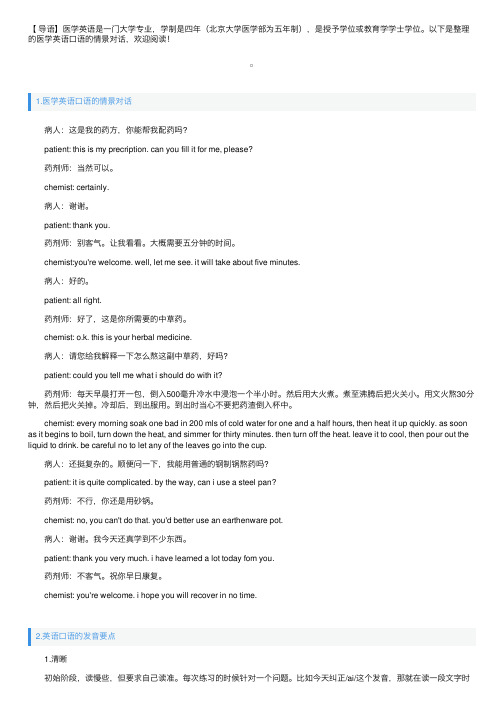
【导语】医学英语是⼀门⼤学专业,学制是四年(北京⼤学医学部为五年制),是授予学位或教育学学⼠学位。
以下是整理的医学英语⼝语的情景对话,欢迎阅读!1.医学英语⼝语的情景对话 病⼈:这是我的药⽅,你能帮我配药吗? patient: this is my precription. can you fill it for me, please? 药剂师:当然可以。
chemist: certainly. 病⼈:谢谢。
patient: thank you. 药剂师:别客⽓。
让我看看。
⼤概需要五分钟的时间。
chemist:you're welcome. well, let me see. it will take about five minutes. 病⼈:好的。
patient: all right. 药剂师:好了,这是你所需要的中草药。
chemist: o.k. this is your herbal medicine. 病⼈:请您给我解释⼀下怎么熬这副中草药,好吗? patient: could you tell me what i should do with it? 药剂师:每天早晨打开⼀包,倒⼊500毫升冷⽔中浸泡⼀个半⼩时。
然后⽤⼤⽕煮。
煮⾄沸腾后把⽕关⼩。
⽤⽂⽕熬30分钟,然后把⽕关掉。
冷却后,到出服⽤。
到出时当⼼不要把药渣倒⼊杯中。
chemist: every morning soak one bad in 200 mls of cold water for one and a half hours, then heat it up quickly. as soon as it begins to boil, turn down the heat, and simmer for thirty minutes. then turn off the heat. leave it to cool, then pour out the liquid to drink. be careful no to let any of the leaves go into the cup. 病⼈:还挺复杂的。
- 1、下载文档前请自行甄别文档内容的完整性,平台不提供额外的编辑、内容补充、找答案等附加服务。
- 2、"仅部分预览"的文档,不可在线预览部分如存在完整性等问题,可反馈申请退款(可完整预览的文档不适用该条件!)。
- 3、如文档侵犯您的权益,请联系客服反馈,我们会尽快为您处理(人工客服工作时间:9:00-18:30)。
还疼吗?
70.How long have you had this pain?
你从什么时侯开始有这种痛的?
71. What kind of pain is it?
是什么样的痛?
72. Please tell me something of your past illnesses.
现在还不好说是什么问题。
32. This is quite common among people of your age.
在您这样岁数人当中,这可太寻常了.
This often happens to people of your age.
这种情况经常发生在你这样岁数的人.
This often occurs at your age.
你的胃有过烧心感(稀便,胸痛)吗?
49. Do your want to have your tooth extracted (tooth filled, dressing changed,blood pressure checked?
你要拔牙(补牙,换药,量血压)吗?
50.Let me examine you please.
请深呼正常呼吸).
58. Please stick Out your tongue.
请伸出舌头.
59.Please let me feel your pulse.
让我摸摸你的脉搏。
60.Let me take your blood pressure
我给你量一下血压.
61.Pleas,lift your left leg(right leg)
You can carry on with your work.
可以继续工作。
12. You should be very careful for a week or two
这一两周内,你需要很注意。
13. Try to relax and keep calm.
尽量放松保持镇静。
14. You'll soon be all right.
36. Your WBC(RBC, hemoglobin,urine stool,sputum) should be checked.
你的白细胞(红细胞,血红蛋白,尿,大便,痰)需要检查一下.
37. A smear should be taken.
需要做个涂片.
A culture should be done.
请脱下裤子.
54. Please lie on your back (stomach, right side, left side)。
请仰卧(俯卧,右侧卧,左侧卧)。
55.Please bend your knees.
请屈膝.
56.pleare relax.
请放松.
57. Please breathe deeply(normally).
医务人员常用语
1. What can do for you?
你有什么事?
2.May I help you?
我能帮你什么忙?
8.Please take a seat!
please sit down!
请坐下.
4.Wait a moment, please.
请等一等.
5.Sorry to have kept you waiting.
47.Have your ever had jaundice (low grade fever,any chronic ailments, cold sweats at night, attacks of asthma)?
你有过黄疸(发低烧,任何慢性病,夜间出冷汗,哮喘发作)吗?
48.Do you sufer from heartburn stomachaches (loose bowel movements,chest pains)?
你很快就会好起来的.
15. 1'm sure this medicine will help you a great deal.
这药对你肯定会很有效的.
16. Feeling well again is a rather slow process,I'm afraid.
恐怕痊愈将是一个很慢的过程.
34.I suggest you do some light exercises.
我建议你做些轻微的锻炼。
I suggest you have a course of acupuncture.
我自颇胞一个疗程的针灸.
I suggest that you get physiotherapy treatment.
Are you feeling well?
Are you feeling nausea?
Have you had this experience before?
Have you got any chronic diseases in the past?
Have you got any feeling of nausea?
17. You will have to wait for twenty minutes.
你需要等20分钟.
18.Complete recovery will take a rather long time.
彻底恢复需要一段很长的时间。
19. You will have to come here for periodical check-ups.
需要做个培养。
38. Please don't eat anything tomorrow morning before blood test.
明早查血以前不要吃东西。
39. Please wait for the result of your hemoglobin test.
请等一下你的血红蛋白化验结果.
40. What's your trouble?
你哪里觉着不好?
41. How long have you been feeling unwell?
你不舒服多久了。
42. What medicine did you take?
你吃的是什么药?
43.Have you taken any medicine?
Have you lost weight recently?
Have you taken anything for it?
Are your bowels acting properly?
请告诉我你过去的病史。
73. Is there any blood in your stool(urine,sputum)?
你的大便里(尿里,痰里)有血吗?
问病史
Asking a patient about his illness
Any vomiting?
Are you feeling all right?
这就ห้องสมุดไป่ตู้常出在你这种岁数上。
33. This kind of illness usually occurs among people whose work requires a lot of concentration(who undergo a lot of stress).
这种病通常发生在工作要求精神高度集中的(精神紧张的)人们当中。
对不起让你久等了.
6.It is not serious.
病情不严重.
7.Don't worry.
There is nothing to worry about.
不必顾虑。
8.You need a thorough examination.
你需要做一个全面检查.
9.You will have to stay in hospital for sevral days.
你需要在医院里住几夭.
We think that you had better be hospitalized
我们认为你最好住进医院来。
10. You should stay in bed for a few days.
你需要卧床几天.
11. You can keep on working.
我建议你作理疗。
I suggest that you take Chinese herbs.
我建议你吃中药。
35.I would like to transfer you to the gynecology (surgery,dermatology, urology department。
我要将你转到妇科(外科、皮科、泌尿科)去.
你需要定期来门诊检查.
20. If you feel worse, please come back to the clinic right away.
要是你觉着病加重了,就请马上来门诊。
21.If you feel worried, don't hesitate to go to the clinic anytime, day or night.
你以前治过吗?
65. Has it gotten worse?
情况变坏了吗?
66.Has it happened before?
这种情况以前发生过吗?
67. Are you feeling better?
